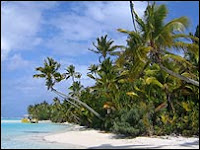Leaving Captain Cook's 'paradise'
By Nick Squires
BBC, Cook Islands
With their blue lagoons, white sand beaches and palm trees, the Cook Islands present, at first glance, a vision of paradise. But the islands are also experiencing a slow exodus as people seek a better standard of living.
蔚藍的潟湖、白色的沙灘和迎風搖曳的棕櫚樹,乍看之下庫克群島呈現出天堂般的美景。但是隨著人們紛紛追求更好的生活,群島也正經歷著一波緩慢的人口外移。

It is all but impossible to get lost on Rarotonga, the picturesque main island of the Cook Islands.
There are two roads and two buses. The front of each bus bears a sign which indicates its destination, or rather its direction.
要在庫克群島風景如畫的主島Rarotonga迷路幾乎是不可能的。因為島上只有兩條道路及兩輛公車。每輛公車前掛有一個標誌註明她的終點,或者應該說是她的方向。
One is marked Clockwise, the other Anti-clockwise, and they leave from the Cook Islands' sleepy capital, Avarua.
一個是順時針方向、另一個則是逆時針方向,兩班車都是從庫克群島那叫人昏昏欲睡的首都Avarua出發。
Forty minutes is all it takes to go right round the island, which is only 20 miles (32km) in circumference.
周長不過只有20哩,因此環島一圈只需40分鐘。
Before you know it, you are back where you started.
等你繞回出發地點還渾然不覺。
The bus travels along a winding coastal road, passing smart beach resorts, quiet villages and beautiful 19th-Century churches built out of crushed coral and lime, dazzling white in the sunshine.
公車順著曲折彎延的岸邊小路行駛,一路上經過幾個漂亮的海灘勝地和幾座建於19世紀美麗的教堂,教堂是以碎珊瑚與石灰所打造,在陽光下潔白耀眼。
But between the fields of ripening paw paw and the luxuriant hedges of bougainvillea and hibiscus you also see many empty houses, shuttered and forlorn, slowly mouldering in the tropical heat.
但是在成熟的paw paw樹、濃密的九重葛樹籬與木槿重重交錯間,依然可窺見許多空蕩蕩的房子,窗板關著、孤寂荒涼,然後在熱帶暑氣中逐漸崩塌。
Doors and windows are boarded up, the gardens have run riot and there is often an old car rusting away in the drive.
門窗用木條給釘上,花園雜草蔓生,停在私家車道上的舊車往往也是任其銹爛。
They are the homes of Cook Islanders who have left the country in search of higher-paying jobs and better education for their children.
這些原為庫克群島居民的家,他們為了尋找待遇更好的工作以及他們的下一代能有更好的教育而離開著個國家。
Most of them go to New Zealand. A special arrangement means that islanders are automatically entitled to Kiwi citizenship.
大部份的人到紐西蘭去。因為一項特殊的協議,讓島上的居民自動賦予紐西蘭公民的身份。
Others make their way to Australia or the United States.
其他的則是到澳洲或者美國去了。
Dramatic scenery

Depopulation is a huge issue here. About 14,000 people live in the Cooks but another 80,000 live overseas, with big expatriate communities in Auckland, Wellington and Sydney.
在這裡,人口減少是個大問題。目前住在庫克群島上的約有一萬四千人,但是其他旅居海外的就有八萬人,奧克蘭、威靈頓及雪梨等地就有幾個較大的旅外社區。
At first glance you wonder why anyone in their right mind would possibly want to leave a place like this.
乍看下,你會懷疑任何腦筋正常的人是不會想要離開這種地方。
The Cook Islands are the epitome of the South Seas tropical hideaway.
庫克群島是南太平洋充滿熱帶風情與世隔絕的典範。
The beaches are long and all but empty, the sand is bone white, the lagoons a hundred different shades of blue and the coral reefs home to jewel-like tropical fish and giant clams.
連綿的海灘幾乎沒有什麼人跡,骨白色的沙,座座潟湖透著許多深淺不一的藍,還有珊瑚礁裡住著寶石般瑰麗的熱帶魚和巨蚌。
As a local tourism slogan goes: "Visit Heaven - while you're still on Earth."
就像當地旅遊業的標語所傳達的: "造訪天堂 – 趁你還活著的時候。"
Fifteen islands make up this tiny country, scattered over an area of ocean the size of Western Europe.
這個由十五座小島所組成的國家,散佈在海洋的總面積約有西歐這麼大。
Rarotonga is particularly dramatic, a volcanic remnant with a mountainous interior made up of dark green peaks, razorback ridges and sheer cliffs.
Rarotonga格外引人注意,深綠色的頂峰,削尖的山脊和陡峭的崖壁是火山內部噴發的遺跡。
The Cook Islands' beauty and its laid-back pace of life have ensured that tourism is the main employer and the biggest earner.
庫克群島渾然天成的美景與悠閒的生活步調,確保了觀光業是最重要的業主同時也是最大的贏家。
Honeymooners flock here, as do people wanting to get married on the beach.
就因為人們想在海灘結婚,這裡聚集了許多前來度蜜月的人。
The place is choc-a-bloc with canoodling lovebirds, so much so that I often felt I was the only lone traveller in the whole country.
這地方總是有許多摟抱在一起的情侶,多到讓我常覺得自己在這個國度裡是唯一孤單的遊客。
Cannibal tourism
As if romance and resorts are not enough to entice tourists, Cook Islanders are also happy to play up their sometimes bloodthirsty past.
彷彿這裡的浪漫與這些渡假勝地不夠吸引觀光客時,庫克群島的島民們也很樂意強調他們時而嗜殺的過去。

In other parts of the Pacific the mere mention of the C-word - cannibalism - can cause grave offence. But here the locals make light of their ancestors' habit of eating their enemies.
在太平洋的其他部份僅是提起這個C開頭的Cannibalism吃人這個字,可能會招至極大的反感。但在這裡,當地人對他們祖先吃掉敵人的行為完全不以為意。
I came across T-shirts being sold in the local market with a cartoon of an islander dangling a boggle-eyed white man over a steaming pot. "Send more tourists," the caption read. "The last lot were delicious."
我在當地的市場看過幾件上面印有卡通圖案正準備要出售的T-shirts,繪製著一個島民將一個眼神驚恐的白種人吊在滿是蒸氣的大鍋上。"送更多的遊客來,"標題寫著。"上一批很可口"。
A boat skipper I met recounted with relish how his ancestors would prepare a large underground oven - or umu - in which to cook their victims.
我遇到一位船長加油添醋的講述他的祖先們總會準備一個覆蓋在地下的灶或者稱為umu,準備拿來燉煮他們的敵人。
"In those days if you made one little mistake, we'd eat you," he said, chuckling to himself. "But then the missionaries came and people realised that they shouldn't eat each other any more."
"在那時如果你犯了點小錯,我們就會把你給吃了,"他說著便逕自咯咯地笑了起來。"但是接著傳教士來到這裡,大家才意識到不應該再有任何吃人的行為了。"
Returnees
The captain was telling me this as we cruised the lagoon of Aitutaki, an island to the north of Rarotonga.
船長跟我說這些時,我們正航行在Aitutaki的潟湖上,這座(環狀珊瑚)島就位在Rarotonga的北方。

The lagoon, acclaimed as the most beautiful in the world, is enclosed by a string of idyllic sandy islands.
這座潟湖被譽為是世上最美的,由一長串景色優美被沙所覆蓋著的小島所圍繞。
Some of them were used earlier this year for the latest series of Survivor, the American reality TV show.
就在今年(2006)年初時,其中幾座小島還被拿來做為最新一季Survivor(我要活下去) - 這個美國實境節目秀的拍攝地點。
They have also been the setting for a British show, Shipwrecked. Together these productions have brought millions of pounds and hundreds of jobs.
這裡同時也是英國影集Shipwrecked的拍攝場景。相繼幾部影集已為當地帶來幾百萬英磅以及幾百個工作機會。
Many islanders told me of friends and relatives who have decided to come home after years abroad.
許多島民告訴我,他們的親友在旅居海外數年後已經決定要回家了。
They also seem to have coincided with a renewed sense of optimism.
他們似乎也同樣再度回復到原來樂觀的樣子了。
Typical of the trend was a guide called Nga who took me on a tour of Aitutaki's interior in his bright yellow Landrover.
開著鮮黃色的Landrover載我遊覽Aitutaki內陸的嚮導叫做Nga,他足以做為這股趨勢的代表。
He spent 10 years working in a paper mill in Melbourne. "I got sick of the rat race," he said. "So I decided to come home."
他在墨爾本的造紙廠工作了十年。"我厭倦那種沒完沒了的競爭,"他說。"所以我決定回家。"
He now has a thriving business. "A lot of people are coming back," he said as we jolted along a rough dirt track built by the Americans in World War II.
他現在有一間生意蒸蒸日上的公司。"很多人都要回來了,"當我們顛簸在二次大戰時由美軍所鋪設簡陋的煤渣跑道上時他這樣說。
It would, however, require a truly epic economic renaissance to tempt back even half the Cook Islands' far-flung diaspora.
然而,這可得是個非常巨大的經濟復甦,才能吸引半數庫克島那些遠渡重洋離鄉背井的人回家。
That is unlikely to happen any time soon. The islands will retain their easy-going charm and sense of isolation.
那在近期內是不太可能發生。這個群島將保留他們原有悠然的魅力以及遺世獨立感覺。
A taxi driver I met, a formidable matriarch with five grandchildren, put it this way: "God gave us a little piece of paradise in this secret corner of the world."
我遇到一位計程車司機,她是位望而生畏、有五個孫子的女族長,她這樣表達她的看法: "神所賜予我們的是在這世界偏遠角落裡的一小塊樂土"。
Anywhere else, that would sound like tourist brochure hype. Down here in the Cook Islands, they really mean it.
在任何其他的地方,這些聽起來像是旅遊手冊裡天花亂墜的吹噓。在庫克群島,那都是真的。
Story from BBC NEWS:
http://news.bbc.co.uk/go/pr/fr/-/2/hi/programmes/from_our_own_correspondent/6112916.stm
Published: 2006/11/04 13:24:57 GMT
© BBC MMVIII
By Nick Squires
BBC, Cook Islands
With their blue lagoons, white sand beaches and palm trees, the Cook Islands present, at first glance, a vision of paradise. But the islands are also experiencing a slow exodus as people seek a better standard of living.
蔚藍的潟湖、白色的沙灘和迎風搖曳的棕櫚樹,乍看之下庫克群島呈現出天堂般的美景。但是隨著人們紛紛追求更好的生活,群島也正經歷著一波緩慢的人口外移。

It is all but impossible to get lost on Rarotonga, the picturesque main island of the Cook Islands.
There are two roads and two buses. The front of each bus bears a sign which indicates its destination, or rather its direction.
要在庫克群島風景如畫的主島Rarotonga迷路幾乎是不可能的。因為島上只有兩條道路及兩輛公車。每輛公車前掛有一個標誌註明她的終點,或者應該說是她的方向。
One is marked Clockwise, the other Anti-clockwise, and they leave from the Cook Islands' sleepy capital, Avarua.
一個是順時針方向、另一個則是逆時針方向,兩班車都是從庫克群島那叫人昏昏欲睡的首都Avarua出發。
Forty minutes is all it takes to go right round the island, which is only 20 miles (32km) in circumference.
周長不過只有20哩,因此環島一圈只需40分鐘。
Before you know it, you are back where you started.
等你繞回出發地點還渾然不覺。
The bus travels along a winding coastal road, passing smart beach resorts, quiet villages and beautiful 19th-Century churches built out of crushed coral and lime, dazzling white in the sunshine.
公車順著曲折彎延的岸邊小路行駛,一路上經過幾個漂亮的海灘勝地和幾座建於19世紀美麗的教堂,教堂是以碎珊瑚與石灰所打造,在陽光下潔白耀眼。
But between the fields of ripening paw paw and the luxuriant hedges of bougainvillea and hibiscus you also see many empty houses, shuttered and forlorn, slowly mouldering in the tropical heat.
但是在成熟的paw paw樹、濃密的九重葛樹籬與木槿重重交錯間,依然可窺見許多空蕩蕩的房子,窗板關著、孤寂荒涼,然後在熱帶暑氣中逐漸崩塌。
Doors and windows are boarded up, the gardens have run riot and there is often an old car rusting away in the drive.
門窗用木條給釘上,花園雜草蔓生,停在私家車道上的舊車往往也是任其銹爛。
They are the homes of Cook Islanders who have left the country in search of higher-paying jobs and better education for their children.
這些原為庫克群島居民的家,他們為了尋找待遇更好的工作以及他們的下一代能有更好的教育而離開著個國家。
Most of them go to New Zealand. A special arrangement means that islanders are automatically entitled to Kiwi citizenship.
大部份的人到紐西蘭去。因為一項特殊的協議,讓島上的居民自動賦予紐西蘭公民的身份。
Others make their way to Australia or the United States.
其他的則是到澳洲或者美國去了。
Dramatic scenery

Depopulation is a huge issue here. About 14,000 people live in the Cooks but another 80,000 live overseas, with big expatriate communities in Auckland, Wellington and Sydney.
在這裡,人口減少是個大問題。目前住在庫克群島上的約有一萬四千人,但是其他旅居海外的就有八萬人,奧克蘭、威靈頓及雪梨等地就有幾個較大的旅外社區。
At first glance you wonder why anyone in their right mind would possibly want to leave a place like this.
乍看下,你會懷疑任何腦筋正常的人是不會想要離開這種地方。
The Cook Islands are the epitome of the South Seas tropical hideaway.
庫克群島是南太平洋充滿熱帶風情與世隔絕的典範。
The beaches are long and all but empty, the sand is bone white, the lagoons a hundred different shades of blue and the coral reefs home to jewel-like tropical fish and giant clams.
連綿的海灘幾乎沒有什麼人跡,骨白色的沙,座座潟湖透著許多深淺不一的藍,還有珊瑚礁裡住著寶石般瑰麗的熱帶魚和巨蚌。
As a local tourism slogan goes: "Visit Heaven - while you're still on Earth."
就像當地旅遊業的標語所傳達的: "造訪天堂 – 趁你還活著的時候。"
Fifteen islands make up this tiny country, scattered over an area of ocean the size of Western Europe.
這個由十五座小島所組成的國家,散佈在海洋的總面積約有西歐這麼大。
Rarotonga is particularly dramatic, a volcanic remnant with a mountainous interior made up of dark green peaks, razorback ridges and sheer cliffs.
Rarotonga格外引人注意,深綠色的頂峰,削尖的山脊和陡峭的崖壁是火山內部噴發的遺跡。
The Cook Islands' beauty and its laid-back pace of life have ensured that tourism is the main employer and the biggest earner.
庫克群島渾然天成的美景與悠閒的生活步調,確保了觀光業是最重要的業主同時也是最大的贏家。
Honeymooners flock here, as do people wanting to get married on the beach.
就因為人們想在海灘結婚,這裡聚集了許多前來度蜜月的人。
The place is choc-a-bloc with canoodling lovebirds, so much so that I often felt I was the only lone traveller in the whole country.
這地方總是有許多摟抱在一起的情侶,多到讓我常覺得自己在這個國度裡是唯一孤單的遊客。
Cannibal tourism
As if romance and resorts are not enough to entice tourists, Cook Islanders are also happy to play up their sometimes bloodthirsty past.
彷彿這裡的浪漫與這些渡假勝地不夠吸引觀光客時,庫克群島的島民們也很樂意強調他們時而嗜殺的過去。

In other parts of the Pacific the mere mention of the C-word - cannibalism - can cause grave offence. But here the locals make light of their ancestors' habit of eating their enemies.
在太平洋的其他部份僅是提起這個C開頭的Cannibalism吃人這個字,可能會招至極大的反感。但在這裡,當地人對他們祖先吃掉敵人的行為完全不以為意。
I came across T-shirts being sold in the local market with a cartoon of an islander dangling a boggle-eyed white man over a steaming pot. "Send more tourists," the caption read. "The last lot were delicious."
我在當地的市場看過幾件上面印有卡通圖案正準備要出售的T-shirts,繪製著一個島民將一個眼神驚恐的白種人吊在滿是蒸氣的大鍋上。"送更多的遊客來,"標題寫著。"上一批很可口"。
A boat skipper I met recounted with relish how his ancestors would prepare a large underground oven - or umu - in which to cook their victims.
我遇到一位船長加油添醋的講述他的祖先們總會準備一個覆蓋在地下的灶或者稱為umu,準備拿來燉煮他們的敵人。
"In those days if you made one little mistake, we'd eat you," he said, chuckling to himself. "But then the missionaries came and people realised that they shouldn't eat each other any more."
"在那時如果你犯了點小錯,我們就會把你給吃了,"他說著便逕自咯咯地笑了起來。"但是接著傳教士來到這裡,大家才意識到不應該再有任何吃人的行為了。"
Returnees
The captain was telling me this as we cruised the lagoon of Aitutaki, an island to the north of Rarotonga.
船長跟我說這些時,我們正航行在Aitutaki的潟湖上,這座(環狀珊瑚)島就位在Rarotonga的北方。

The lagoon, acclaimed as the most beautiful in the world, is enclosed by a string of idyllic sandy islands.
這座潟湖被譽為是世上最美的,由一長串景色優美被沙所覆蓋著的小島所圍繞。
Some of them were used earlier this year for the latest series of Survivor, the American reality TV show.
就在今年(2006)年初時,其中幾座小島還被拿來做為最新一季Survivor(我要活下去) - 這個美國實境節目秀的拍攝地點。
They have also been the setting for a British show, Shipwrecked. Together these productions have brought millions of pounds and hundreds of jobs.
這裡同時也是英國影集Shipwrecked的拍攝場景。相繼幾部影集已為當地帶來幾百萬英磅以及幾百個工作機會。
Many islanders told me of friends and relatives who have decided to come home after years abroad.
許多島民告訴我,他們的親友在旅居海外數年後已經決定要回家了。
They also seem to have coincided with a renewed sense of optimism.
他們似乎也同樣再度回復到原來樂觀的樣子了。
Typical of the trend was a guide called Nga who took me on a tour of Aitutaki's interior in his bright yellow Landrover.
開著鮮黃色的Landrover載我遊覽Aitutaki內陸的嚮導叫做Nga,他足以做為這股趨勢的代表。
He spent 10 years working in a paper mill in Melbourne. "I got sick of the rat race," he said. "So I decided to come home."
他在墨爾本的造紙廠工作了十年。"我厭倦那種沒完沒了的競爭,"他說。"所以我決定回家。"
He now has a thriving business. "A lot of people are coming back," he said as we jolted along a rough dirt track built by the Americans in World War II.
他現在有一間生意蒸蒸日上的公司。"很多人都要回來了,"當我們顛簸在二次大戰時由美軍所鋪設簡陋的煤渣跑道上時他這樣說。
It would, however, require a truly epic economic renaissance to tempt back even half the Cook Islands' far-flung diaspora.
然而,這可得是個非常巨大的經濟復甦,才能吸引半數庫克島那些遠渡重洋離鄉背井的人回家。
That is unlikely to happen any time soon. The islands will retain their easy-going charm and sense of isolation.
那在近期內是不太可能發生。這個群島將保留他們原有悠然的魅力以及遺世獨立感覺。
A taxi driver I met, a formidable matriarch with five grandchildren, put it this way: "God gave us a little piece of paradise in this secret corner of the world."
我遇到一位計程車司機,她是位望而生畏、有五個孫子的女族長,她這樣表達她的看法: "神所賜予我們的是在這世界偏遠角落裡的一小塊樂土"。
Anywhere else, that would sound like tourist brochure hype. Down here in the Cook Islands, they really mean it.
在任何其他的地方,這些聽起來像是旅遊手冊裡天花亂墜的吹噓。在庫克群島,那都是真的。
Story from BBC NEWS:
http://news.bbc.co.uk/go/pr/fr/-/2/hi/programmes/from_our_own_correspondent/6112916.stm
Published: 2006/11/04 13:24:57 GMT
© BBC MMVIII


沒有留言:
張貼留言